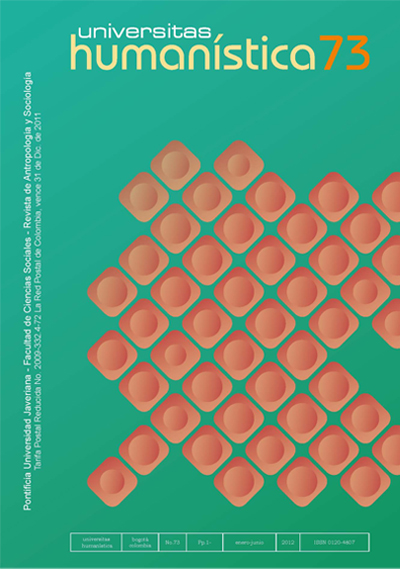Abstract
Colombian society is changing in the religious sphere. This article describes that process in quantitative terms, based on the results of a survey conducted in 2010 in major cities throughout the country, many mid-size cities, and the rural region of Urabá. We describe the relationship between religious pluralization and demographic, regional and socioeconomic variables. We also explore the relationship between religious pluralization and social pluralism, i.e., examine the extent to which religious change implies greater tolerance and respect for minorities. Among the research findings we highlight the fast and steady growth of new religious movements, especially the Pentecostal evangelical movement. The pluralization process varies according to demographic variables, with the greatest impact on the youth and women. It also differs according to socioeconomic variables, for different social strata hold different religious preferences. On the other hand, the research shows that Colombian society keeps being Christian, but its Christianity is changing, and the Catholic Church has lost its monopoly on symbolic goods of salvation. Paradoxically, although the process of religious recomposition takes place in the context of growing secularization, the secularization of Colombian society, instead of discouraging religious practices, has been accompanied by their revival.

This journal provides immediate open access to its content on the principle that making research freely available to the public, encourages greater global exchange of knowledge.
The journal Universitas Humanística is registered under a Creative Commons Attribution 4.0 International Public License. Thus, this work may be reproduced, distributed, and publicly shared in digital format, as long as the names of the authors and Pontificia Universidad Javeriana are acknowledged. Others are allowed to quote, adapt, transform, auto-archive, republish, and create based on this material, for any purpose (even commercial ones), provided the authorship is duly acknowledged, a link to the original work is provided, and it is specified if changes have been made. Pontificia Universidad Javeriana does not hold the rights of published works and the authors are solely responsible for the contents of their works; they keep the moral, intellectual, privacy, and publicity rights.
Approving the intervention of the work (review, copy-editing, translation, layout) and the following outreach, are granted through an use license and not through an assignment of rights. This means the journal and Pontificia Universidad Javeriana cannot be held responsible for any ethical malpractice by the authors. As a consequence of the protection granted by the use license, the journal is not required to publish recantations or modify information already published, unless the errata stems from the editorial management process. Publishing contents in this journal does not generate royalties for contributors.


